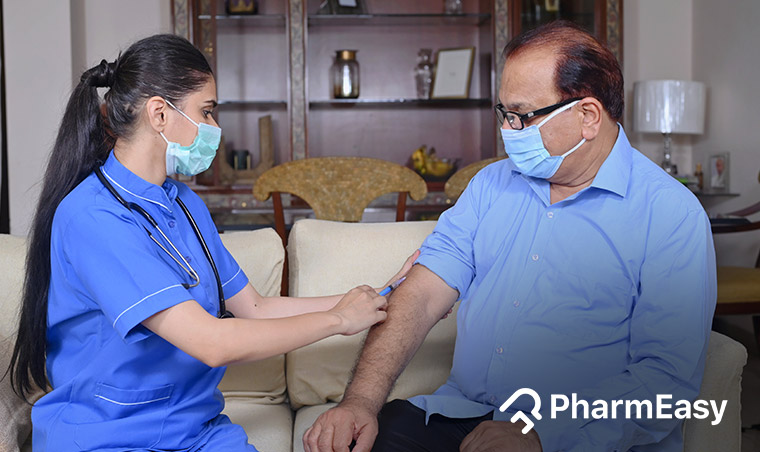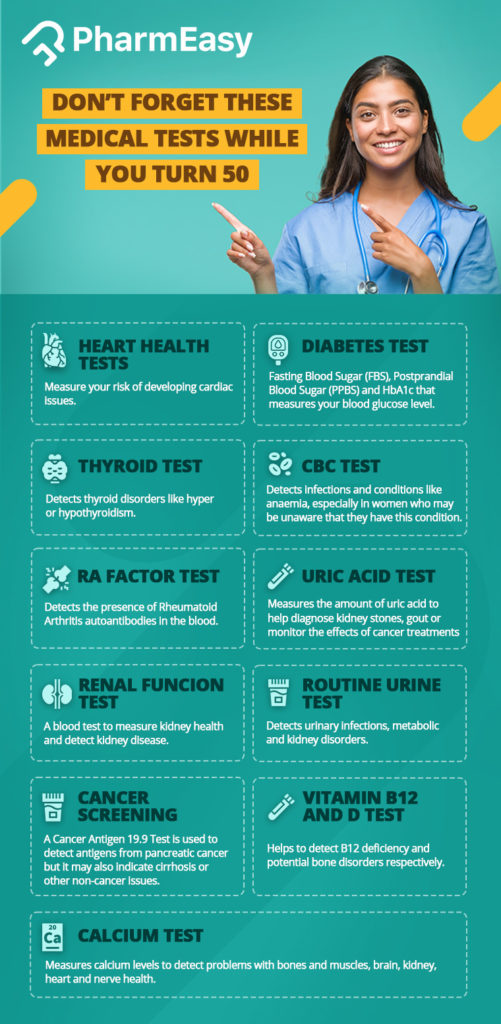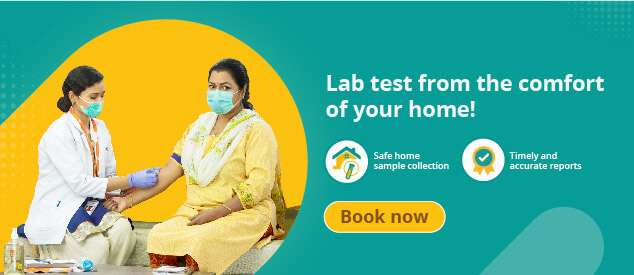Don’t Forget These Medical Tests While You Turn 50
By Shreya Gupta +2 more

Download PharmEasy App




Register to Avail the Offer
Send OTPBy continuing, you agree with our Privacy Policy and Terms and Conditions
By Shreya Gupta +2 more
Table of Contents
Your 50’s should be the prime of your life. Most people imagine a comfortable family life with fewer worries than in your younger days. But poor health can rob you of this peaceful future. Luckily, with advances in medicine, there is plenty you can do to keep good health.

A trend we see is people visiting the doctor only when something goes wrong. While this type of curative medicine is common, preventive health is fast becoming an integral part of medicine. After all, having an increased lifespan is only enjoyable if you have a longer health span too!
Mammograms and Pap smears in females and prostate examinations apart from the routine heart, kidney and liver function tests are highly recommended in elderly and geriatric people to prevent and probably diagnose diseases at an early stage.
Dr. Ashish Bajaj, M.B.B.S., M.D
Preventative medical tests help to catch early warning signs of potential issues before any symptoms show up. There are a variety of screening tests that are recommended based on age milestones. When you are 50, your risk of developing long term serious medical issues rises.
Eating healthy, avoiding poor lifestyle choices (like smoking) and getting regular exercise are all part of preventive health care. But some medical conditions (for example, cancer) can affect even the most healthy person. Before you ask what medical tests do I need at 50? Let us first answer the question – how do these screening tests help you?
Not only blood tests, one should visit a doctor for a physical examination, eye exam, dental check-ups, echo, TMT etc. after 50.
Dr. Arpit Verma, MBBS, MD (Pharmacology)
By having regular checkups and tests during your 50s, you and your doctor can monitor your health. There are several key markers that can indicate what’s going on inside your body. In case your doctor notices some measurement in your blood is out of the normal range, they can inform you. This early warning allows you to start treatment early and avoid further damage to your body.
If you are in your 50s, these will be what the doctor prescribes when you ask them what medical tests do I need at 50? Let’s dive in:

The Cardiac Risk markers test acts as a holistic suite of tests to measure your risk of developing cardiac issues. These also include testing for high blood pressure, high cholesterol and even examining your family history.
Along with that, there is the Lipid Profile Test to measure your triglycerides and cholesterol. This is helpful not only for trying to ascertain heart problems but also pancreatitis and other issues.
Meeting with your cardiologist once a year is also recommended, especially if you are at risk for developing cardiovascular problems. Your cardiologist may perform only a physical exam or and ask about your health. But they may also prescribe:
Lastly, your doctor may also ask you to check your blood pressure regularly at home.
I routinely advise Hba1c, Liver and kidney function tests, lipid profile, Prostate specific antigen for males, Pap smear for females, ECG, ECHO, TMT for all my patients above 50 yearly.
Dr. M.G. Kartheeka, MBBS, MD
Your doctor may ask you to get these tests done several times a year if you have a high risk of diabetes. For those with a confirmed diabetes diagnosis, you may need to do an at-home blood glucose test more frequently.
Another important diabetes and prediabetes test is the HbA1c test, which measures the amount of haemoglobin in your blood that is attached to glucose. Since there has been an increase in diabetes cases in northern and western parts of India, this important test can help to detect and confirm diabetes.
Cancer treatment has come a long way and early screening is an important part of that. For men, it is recommended to take the PSA (Prostate-Specific Antigen test). This test helps to monitor for prostate cancer, depending on your level of PSA, you may be asked to get this test once every 2 – 4 years or less.
For women, there are several cancer screening tests. Mammography is a test to detect any abnormalities in the breasts, which could indicate breast cancer. A Pap smear test takes minute samples from the cervix for observation to detect cancerous or precancerous cells. It helps to preemptively detect cervical cancer. Another cancer test for women is the CA 125 (Cancer Antigen 125) test, which can be used as a screening for ovarian cancer. It should be noted that high levels of CA 125 do not always mean cancer is present.
One other common cancer screening test, regardless of gender, is the CA 19.9 test (Cancer Antigen 19.9). It is used to detect antigens from pancreatic cancer but it may also indicate cirrhosis or other non-cancer issues.
Also Read: Is Lemon Good for Hair? Exploring Research-Based Facts and Myths
Even if you do not show any serious symptoms, things can still be going wrong inside. The older we get, the more our body’s natural repair and metabolism rate decreases. Slower metabolism also means that as you age, it becomes easier to put on weight. As you can see, it becomes more important as you hit 50 to make preventive tests part of your healthcare routine. With the right tests at the right time, you can avoid serious (and expensive) long term medical issues.

Disclaimer: The information provided here is for educational/awareness purposes only and is not intended to be a substitute for medical treatment by a healthcare professional and should not be relied upon to diagnose or treat any medical condition. The reader should consult a registered medical practitioner to determine the appropriateness of the information and before consuming any medication. PharmEasy does not provide any guarantee or warranty (express or implied) regarding the accuracy, adequacy, completeness, legality, reliability or usefulness of the information; and disclaims any liability arising thereof.
Links and product recommendations in the information provided here are advertisements of third-party products available on the website. PharmEasy does not make any representation on the accuracy or suitability of such products/services. Advertisements do not influence the editorial decisions or content. The information in this blog is subject to change without notice. The authors and administrators reserve the right to modify, add, or remove content without notification. It is your responsibility to review this disclaimer regularly for any changes.
Comments